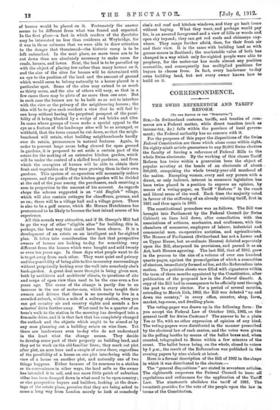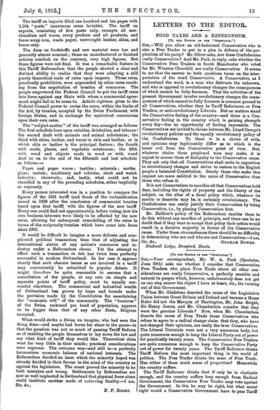CORRESPONDENCE.
THE SWISS REFERENDUM AND TARIFF REFORM.
pro THE Ermos OF TR "SPECTATOR."] Sin,—In Switzerland customs, tariffs, and treaties of nom-. merce are a Federal matter, while direct taxation (such as income-tax, Ito.) falls within the province of local govern• ment ; the Federal authority has no concern with it.
For the purposes of this paper the dispositions of the Swiss Federal Constitution are those which alone come within sight. Its eighty-ninth article guarantees to any 30,000 Swiss electors the faculty of forcing a reference of Federal Bills to the whole Swiss electorate. By the working of this clause Tariff Reform has twice within a generation been the object of popular scrutiny at the hands of an electorate of about 800,000, comprising the whole twenty-year-old manhood of the nation. Excepting women, every and any person with a. direct, or only indirect, interest in economic legislation has been twice placed in a position to express an opinion, by means of a voting-paper, on Tariff " Reform " in the exact and literal sense of the word. Each time the majority voted in favour of the stiffening of an already existing tariff, first in. 1891 and then again in 1903.
The constitutional procedure was as follows. The Bill was brought into Parliament by the Federal Council (or Swiss, Cabinet) on lines laid down, after consultation with the associations of artisans, mechanics, and craftsmen, with the chambers of commerce, employers of labour, industrial and commercial men, co-operative societies, and agriculturists. The Houses of Parliament (Switzerland has not a Lower and an Upper House, but co-ordinate Houses) debated separately
upon the Bill, sharpened its provisions, and passed it as sit Act, both Houses agreeing. The last Bill, that of 1902, grew
in the process to the size of a volume of over one hundred quarto pages, against the promulgation of which a committee of electors, immediately formed ad hoc, set the Referendum into motion. The petition sheets were filled with signatures within.
the term of three months appointed by the Constitution, after publication of the proposed law in the Federal Gazette. A
copy of the Bill had in consequence to be officially sent through, the post to every elector. For a period of several months, extending to March 15th, 1903, the Bill was debated "up and down the country," in every office, counter, shop, farm, market, tap-room, and dwelling-place.
The voting-paper was drawn up in the following form : Do you accept the Federal Law of October 10th, 1902, on the general tariff for Swiss Customs P The answer to be a plain.
Yes or No, with no other expression of opinion of any kind.
The voting-papers were distributed in the manner prescribed by the electoral law of each canton, and the votes were given in the polling booths by means of the ballot boxes and, when counted, telegraphed to Berne within a few minutes of the count. The ballot boxes being, on the whole, closed to voters by 5 p.m., the result of the Referendum was published in the evening papers by nine o'clock at latest.
Here is a formal description of the Bill of 1902 in the shape in which it was distributed to the electors:—
The " general dispositions " are stated in seventeen articles. The eighteenth empowers the Federal Council to issue all regulations and ordinances for the application of the Tariff Law. The nineteenth abolishes the tariff of 1891. The twentieth provides for the vote of the people upon the law in terms of the Constitution. The tariff on imports filled one hundred and ten pages with 1,164 " posts " (maximum rates leviable). The tariff on exports, consisting of five posts only, exempts all mer- chandises and wares, every produce and all products, and taxes scrap iron, waste paper, unwrought leather, skins, and bones only.
The dues on foodstuffs and raw material were low and generally almost nominal ; those on manufactured or finished articles reached, on the contrary, very high figures. But those figures were not final. It was a remarkable feature in this Tariff Referendum that the people showed a clear and distinct ability to realize that they were adopting a still purely theoretical scale of rates upon imports. Those rates, practically prohibitive, were superseded by other rates result- ing from the negotiation of treaties of commerce. The people empowered the Federal Council to put the tariff rates into force against any State with whom a commercial agree- ment might fail to be come to. Article eighteen gives to the Federal Council power to revise the rates, within the limits of the Act, by treaties, accepted by the Swiss Parliament, with foreign States, and in exchange for equivalent concessions upon their own rates.
The " subject-matter " of the tariff was arranged as follows. The first schedule bore upon eatables, drinkables, and tobacco ; the second dealt with animals and animal substances ; the third with skins, leather, and wares in skin and leather, or in which skin or leather is the principal feature ; the fourth with seeds, plants, and vegetable substances ; the fifth with wood and objects made in wood or with wood And so on to the end of the fifteenth and last schedule as follows :— Paper and paper wares ; textiles ; minerals ; earths glass ; metals ; machinery and vehicles ; clock and watch industry ; chemicals ; and, lastly, what could not be classified in any of the preceding schedules, either implicitly or expressly.
Every person interested was in a position to compare the figures of the 1891 tariff (and those of the reclassification issued in 1899 after the conclusion of commercial treaties based upon that tariff) with the figures of the new tariff Every one could find out approximately, before voting, how his own business interests were likely to be affected by the new rates, allowing for subsequent remodelling of the rates in terms of the reciprocity treaties which have come into force since 1902.
It would be difficult to imagine a more delicate and com- plicated political transaction than that of adjusting the international status of any nation's commerce and in- dustry under a Referendum clause. Yet the attempt to effect such a transaction in tote has twice been perfectly successful in modern Switzerland. In her case it appears clearly that such obscure issues as are involved in a tariff may conveniently be submitted to popular debate. It might therefore be quite reasonable to assume that a consultation of the people, at any rate on simple and separate points of tariff policy, must be equally suc- cessful elsewhere. The commercial and industrial wealth of Switzerland has grown by leaps and bounds under the provision made by the Constitution for ascertaining the "economic will" of the community. The "business" of the Swiss, reckoned per head of population, appears to be bigger than that of any other State, Belgium excepted.
-What would strike a Swiss, we imagine, who had seen the thing done—and maybe had borne his share in the game—is that the question was not so much of passing Tariff Reform as of enabling the people themselves to lay down the law and say what kind of tariff they would like. Theoretical dicta went for very little in their minds ; practical considerations were supreme. The outcome was—and still is—a perfectly harmonious economic balance of national interests. The Referendum decided an issue which the minority hoped was already decided in their favour in the mind of the country as against the legislators. The event proved the minority to be both mistaken and wrong. Settlements by Referendum are now so well implanted in Switzerland that physical force alone could institute another mode of achieving finality.—I am, Sir, &c., F. F. ROGE T.



















































 Previous page
Previous page